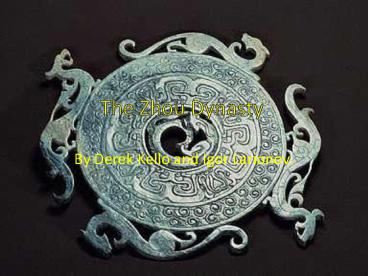The Zhou Dynasty - PowerPoint PPT Presentation
1 / 30
Title:
The Zhou Dynasty
Description:
The greatest Chinese philosophers, ... Shang, Qin, and (possibly) Xia dynasties coexisted together as rulers of independent kingdoms until 286 BC. – PowerPoint PPT presentation
Number of Views:219
Avg rating:3.0/5.0
Title: The Zhou Dynasty
1
The Zhou Dynasty
- By Derek Kello and Igor Larionov.
2
The Beginning Of The Zhou
- The Zhou dynasty of China was founded in c.1027
B.C. - After 771 B.C. the Zhou capital was moved to
Luoyang
3
The Middle Of The Zhou
- States joined to enhance their power, effecting a
centralization of authority within each state. to
open conflict in the period of the Warring States
(403222 B.C.). In 256 B.C. the emerging state of
Qin (Ch'in) conquered the Zhou empire. Struggles
among the states for more land led
4
The Middle Of The Zhou (Cont.)
- After 771 B.C. the Zhou Capital got moved to
luoyang.
5
The Middle of the Zhou (Cont.)
- to open conflict in the period of the Warring
States (403222 B.C.). In 256 B.C. the emerging
state of Qin (Ch'in) conquered the Zhou empire.
6
The Middle Of The Zhou (Cont.)
- In 256 B.C. the emerging state of Qin (Ch'in)
conquered the Zhou empire.
7
Zhou Dynasty Facts
- During the Zhou Dynasty, the use of iron was
introduced to China.
8
Zhou Dynasty Facts
- this period of Chinese history produced what many
consider the zenith of Chinese bronze-ware making.
9
Zhou Dynasty Facts
- The dynasty also spans the period in which the
written script evolved from the ancient stage as
seen in early Western Zhou bronze inscriptions,
to the beginnings of the modern stage, in the
form of the archaic clerical script that emerged
during the late Warring States period.
10
Zhou Dynasty Facts
- During the Zhou Dynasty, the origins of native
Chinese philosophy developed, its initial stages
beginning in the 6th century BC.
11
Zhou Dynasty Facts
- The greatest Chinese philosophers, those who made
the greatest impact on later generations of
Chinese, were Confucius, founder of Confucianism,
and Laozi, founder of Taoism.
12
Zhou Dynasty Facts
- Other philosophers, theorists, and schools of
thought in this era were Mozi, founder of Mohism,
Mencius, a famous Confucian who expanded upon
Confucius' legacy, Shang Yang and Han Feizi,
responsible for the development of ancient
Chinese Legalism
13
Western and Eastern Zhou
- Initially the Ji family was able to control the
country and the people in it firmly. In 771 BC,
after King You had replaced his queen with a
concubine Baosi, the capital was sacked by a
joint force of the queen's father.
14
Western and Eastern Zhou
- The queen's son Ji Yijiu was proclaimed the new
king by nobles from the states of Zheng, Lu, Qin,
Xu and Shen.
15
Western and Eastern Zhou
- The capital was moved eastward in 770 BC from
Haojing to Luoyang in present-day Henan Province.
16
Western and Eastern Zhou
- The Warring States Period extended slightly past
the 256 BC end date of Eastern Zhou.
17
Western And Eastern Zhou
- The Eastern Zhou period is also designated as the
period of the Hundred Schools of Thought.
18
Western And Eastern Zhou
- The four main distinct schools were Confucianism,
Mohism, Taoism and Legalism, along with a host of
others.
19
wWestern And Eastern Zhou
- The ruling families of the Zhou, Shang, Qin, and
(possibly) Xia dynasties coexisted together as
rulers of independent kingdoms until 286 BC.
20
Agriculture in the Zhou Dynasty
- Agriculture in the Zhou Dynasty was very
intensive and in many cases directed by the
government.
21
Agriculture in the Zhou Dynasty
- All farming lands were owned by nobles, who then
gave their land to their serfs, a situation
similar to European feudalism.
22
Agriculture in the Zhou Dynasty
- the government was able to store surplus food and
distribute it in times of famine or bad harvest.
23
Agriculture in the Zhou Dynasty
- a piece of land was divided into nine squares in
the well-field system, with the grain from the
middle square taken by the government and that of
surrounding squares kept by individual farmers.
24
Agriculture in the Zhou Dynasty
- China's first projects of hydraulic engineering
were founded during the Zhou Dynasty, ultimately
for means to aid agricultural irrigation.
25
THE END
- Thank you for watching our show!
26
(No Transcript)
27
(No Transcript)
28
(No Transcript)
29
(No Transcript)
30
(No Transcript)































